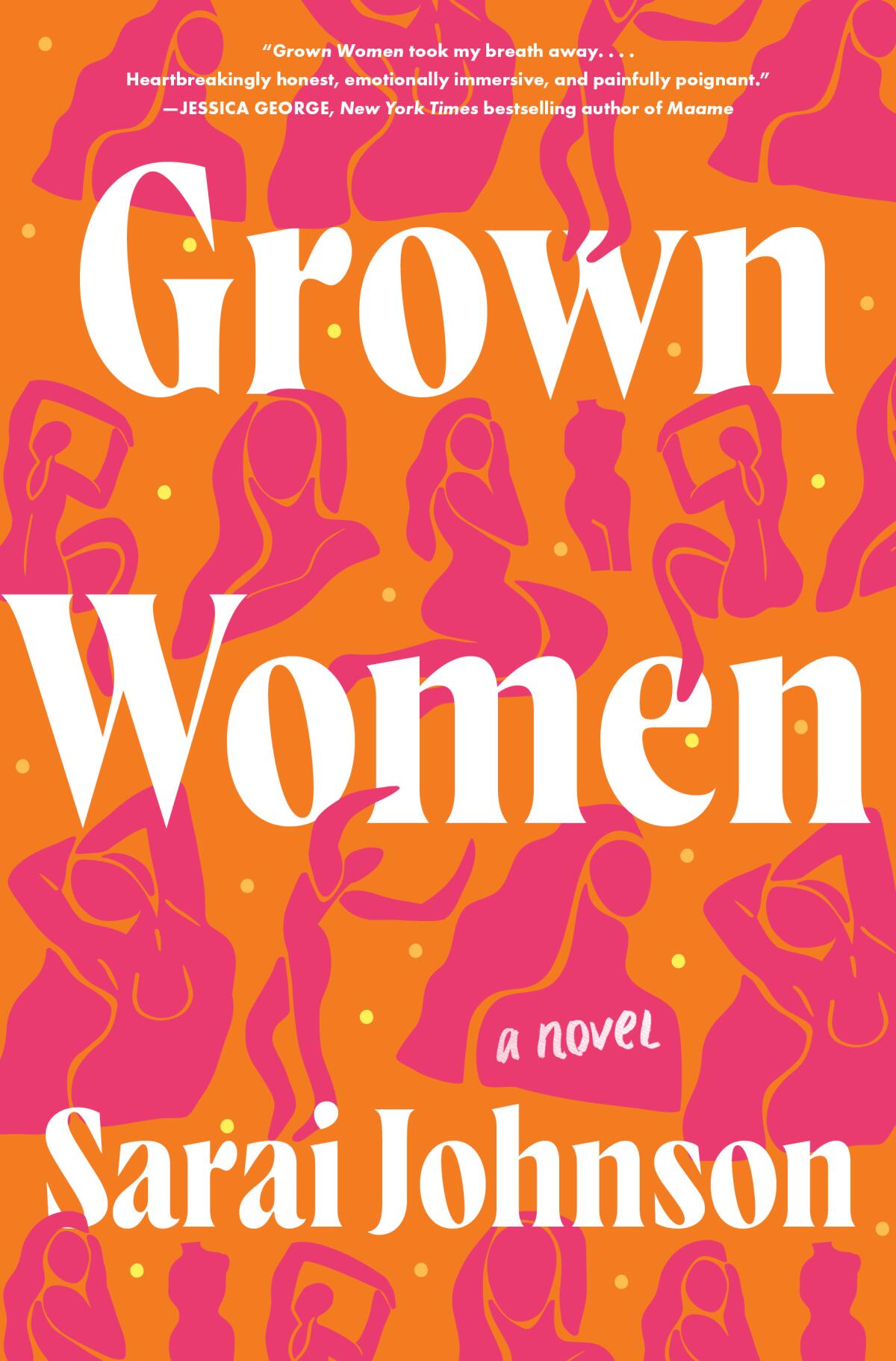Do daughters always have to repeat their mothers’ traumas?

- Share via
Book Review
Grown Women
By Sarai Johnson
Harper: 400 pages, $28
If you buy books linked on our site, The Times may earn a commission from Bookshop.org, whose fees support independent bookstores.
“Somebody up there has got it in for me,” Meryl Streep’s character grumbles in the film “Mamma Mia.” “I bet it’s my mother.”
That sentiment could have been uttered by any of the mothers or daughters in Sarai Johnson’s stirring debut novel, which follows a family of Black women through four generations as they struggle to transcend their violent pasts. “Grown Women” joins a lineage of epic family dramas that erupt with long-hidden secrets, devastating losses and ghosts.
But Johnson’s interests extend beyond family antagonisms. “Grown Women” contemplates what happens when a child can’t depend on “the most basic, essential love the world had to offer,” and how Black women overcome the combined hurdles of generational trauma and a culture that limits nearly every facet of their lives.

The story begins in 1974 Nashville with Charlotte, who recently left Atlanta to escape her mother’s abuse. She gives birth to a baby she has so little interest in delivering that she hasn’t bothered to come up with a name and won’t comfort the girl when she cries. Born into a world of Mercedes-Benzes and Gucci suitcases, and a family who expected her, a talented pianist, to attend Spelman College, Charlotte ends up as a single mother answering phones at a real estate agency.
Four years later, Charlotte’s daughter, Corinna, sweetly colors at the kitchen table while her mother daydreams about filicide. Charlotte decides she needs a husband to relieve the burden of child-rearing. The white man she marries is unfaithful and drinks too much, but he pays the bills and lovingly parents Corinna, while Charlotte never warms to the task.
Laurie Frankel’s new novel, ‘Family Family,’ stars a woman with controversial opinions and a blended family that would make Tolstoy and the Brady Bunch blush.
Charlotte can be hard to root for. Many of her interactions with her young, innocent daughter — “Corinna reached for her mother, but Charlotte recoiled” — are heartbreaking. But the book builds a compelling mystery around what happened to make Charlotte, whose “brand of sadness didn’t come from discrimination or hardship like most Black folks in their part of the world,” so hostile. Johnson masterfully lays breadcrumbs throughout the novel that resonate once Charlotte’s backstory emerges in a genuinely unexpected and meaningful fashion.
Before we get there, Johnson puts us in the 1990s, when Charlotte and Corinna no longer have much to say to each other. At 18, Corinna becomes pregnant by a classmate destined for the NFL. He agrees to provide financial support for their child, Camille, but nothing more. Charlotte vows to help raise the girl, who inherits her grandmother’s beauty and intelligence and also awakens her maternal instinct, which inflames the tension between Charlotte and Corinna.
When she is 7, tragedy alters Camille’s life, setting her on a destructive path. It also widens the distance between her and Corinna, who is repeating the patterns of her own mother and has taken to physically beating Camille.
Johnson holds nothing back in her frank depiction of the cycles of violence the family perpetuates. The mothers also pass on an emotional reserve to their daughters that in many ways shatters their potential. But the women’s emotional bruises and humanity manage to rouse compassion.
I’m a grandmother for the first time. My granddaughter is a change agent for me and a hopeful symbol of reimagined possibilities for the nation.
There is a point of origin for this cycle: Charlotte’s mother, Evelyn, a wealthy woman who believes “crying was undignified.” Her lip-splitting abuse of Charlotte is far from her most egregious offense. Yet even Evelyn seeks connection with her descendants. Although Charlotte has ignored her mother’s attempts to reunite for years, once she decides she and Corinna can’t give the Kate-Moss-and-Teen-Vogue-loving Camille the life she deserves, they ask Evelyn to take the girl in.
As Charlotte at one point tells Camille, “Sometimes, the best thing you can do for people you love is leave ’em.”
All of Camille’s “mothers” see her as a shining light and purpose they can get behind. The central questions of the book become whether Camille will be able to break her family’s cycle, and whether her mothers can overcome their resentments to find peace with themselves and one another.
The novel deftly interrogates how expectations around motherhood might trap women, especially those who don’t want to parent in the first place. It also probes the external realities that can mar Black women’s inner lives. Evelyn, a scholar, researches the Harlem Renaissance artist Gwendolyn Bennett, who, Johnson writes, “died in obscurity after decades serving the movement.” During her studies, Evelyn mysteriously receives a note from what she believes to be a ghost: “Did [the artist] know any different?” it asks. “Would the world have allowed anything else?”
At times, Johnson’s decision to bounce back and forth among the four women’s points of view and time periods — from the ’70s to the ’90s, then back to the ’80s, etc. — can stall the narrative. Scenes revisited from different characters’ perspectives don’t always offer new information.
Still, one can’t help but cheer when these women do manage to reach one another’s hearts. Their journeys suggest that, sometimes, the person who’s got it in for us may also be the person who loves us most.
Laura Warrell is the author of the novel “Sweet, Soft, Plenty Rhythm.”
More to Read
A cure for the common opinion
Get thought-provoking perspectives with our weekly newsletter.
You may occasionally receive promotional content from the Los Angeles Times.











